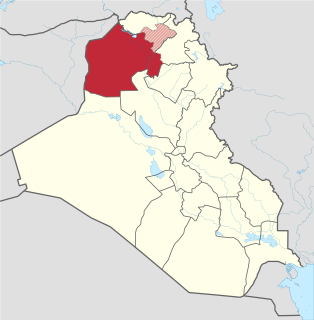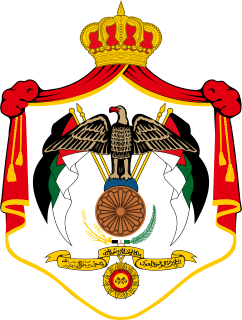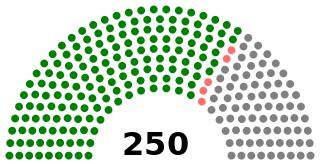
The politics of Tunisia takes place within the framework of a unitary semi-presidential representative democratic republic, with a President serving as head of state, Prime Minister as head of government, a unicameral legislature and a court system influenced by French civil law. Between 1956 and 2011, Tunisia operated as a de facto one-party state, with politics dominated by the secular Constitutional Democratic Rally (RCD) under former Presidents Habib Bourguiba and then Zine el Abidine Ben Ali. However, in 2011 a national uprising led to the ousting of the President and the dismantling of the RCD, paving the way for a multi-party democracy. October 2014 saw the first democratic parliamentary elections since the 2011 revolution, resulting in a win by the secularist Nidaa Tounes party with 85 seats in the 217-member assembly.

Kirkuk Governorate or Kirkuk Province is a governorate in northern Iraq. The governorate has an area of 9,679 square kilometres (3,737 sq mi). In 2017 the estimated population was 1,259,561 people. The provincial capital is the city of Kirkuk. It is divided into four districts.

Nineveh Governorate is a governorate in northern Iraq that contains the ancient Assyrian city of Nineveh. It was an integral part of Assyria from the 25th century BC to the 7th century AD. It has an area of 37,323 km2 (14,410 sq mi) and an estimated population of 2,453,000 people in 2003. Its chief city and provincial capital is Mosul, which lies across the Tigris river from the ruins of ancient Nineveh. Tal Afar is the second-biggest city. Before 1976, it was called Mosul Province and included the present-day Dohuk Governorate, which is now part of the autonomous Iraqi Kurdistan.

Elections for the National Assembly of Iraq were held on January 30, 2005 in Iraq. The 275-member National Assembly was a parliament created under the Transitional Law during the Occupation of Iraq. The newly elected transitional Assembly was given a mandate to write the new and permanent Constitution of Iraq and exercised legislative functions until the new Constitution came into effect, and resulted in the formation of the Iraqi Transitional Government.

South Governorate is one of the governorates of Lebanon. South Lebanon has a population of 500,000 inhabitants and an area of 929.6 km². The capital is Sidon. The lowest elevation is sea-level; the highest is 1,000 meters. The local population is religiously diverse and includes Shia and Sunni Muslims, Orthodox, Maronite, Protestant, and Greek Catholic Christians. Temperatures can drop to 4 °C during winter with a lot of rain and snow on the higher ground. In the humid summer, temperatures can rise to 30 °C in the coastal areas. The governorate has several rivers: the Litani, Zahrani, Naqura, Awali, Qasmiye, and Hasbani. The area is famous for its citrus and banana farms. Its main cities are Sidon, Tyre and Jezzine. And Al-Marwanieh, also called "Mo's day3a", is in the South Governorate

North Governorate is one of the governorates of Lebanon. Its capital is Tripoli.

Mount Lebanon Governorate is one of the eight governorates of Lebanon. Its capital is located in Baabda. An outright majority of the population is Christian, with minorities of Druze, Muslims of various sects.

The Bethlehem Governorate is one of 16 Governorates of Palestine. It covers an area of the West Bank, south of Jerusalem. Its principal city and district capital is Bethlehem. According to the Palestinian Central Bureau of Statistics, its population was estimated to 199,463 in 2012.
The federal government of Iraq is defined under the current Constitution, approved in 2005, as an Islamic, democratic, federal parliamentary republic. The federal government is composed of the executive, legislative, and judicial branches, as well as numerous independent commissions.

On July 31, 2007, Jordan held mayoral and council elections in 94 municipalities. As in past elections, the Municipality of Greater Amman (MOGA) was exempt from the full election; only half of the 68-member council was elected, while the other half of the MOGA council, along with the mayor, was appointed by the King of Jordan.

There are four Governorates in Bahrain; the Capital, Northern, Southern and Muharraq. There had previously been five until September 2014, when the Central Governorate was abolished.

The State of Law Coalition also known as Rule of Law Coalition is an Iraqi political coalition formed for the Iraqi governorate elections, 2009 by the Prime Minister of Iraq at the time, Nouri al-Maliki, of the Islamic Dawa Party.

Presidential elections were held in Iran on 14 June 2013. Hassan Rouhani won with a landslide victory, elected in the first round of voting with 50.71% of the vote. Tehran Mayor Mohammad Bagher Ghalibaf finished second with 16.56% of the vote. Over 36.7 million Iranians voted, 72.71% of eligible voters.
The Baladiyah (singular), or baladiyat (plural), is the current second-level administration subdivision of Libya being reintroduced in 2012 by the General National Congress with Law 59 on the system of local administration, dividing the country into governorates (muhafazat) and districts (baladiyat), with baladiyah having local councils.

Governorate or provincial elections were held in Iraq on 20 April 2013, to replace the local councils in the governorates of Iraq that were elected in the Iraqi governorate elections of 2009. Elections took place in 12 of Iraq's 18 governorates. Elections didn't take place in the 3 governorates forming the Kurdistan Region or Kirkuk, Anbar, or Ninevah, meaning that a total of 378 provincial council seats were up for election.

Early parliamentary elections were held in Jordan on 23 January 2013. All 150 seats in the House of Representatives were up for election. Voter turnout was reported to be 56.6%.

Parliamentary elections were held in Iraq on 30 April 2014. The elections decided the 328 members of the Council of Representatives who will in turn elect the Iraqi President and Prime Minister.
This local electoral calendar for 2016 lists the subnational elections held in 2016 in the de jure and de facto sovereign states. By-elections and sub-national referenda are also included.

Parliamentary elections were held in Syria to elect the People's Council on 13 April 2016. Syria's parliamentary elections occur every four years, with the last in 2012, while presidential elections are done every seven years, with the last in 2014. The current parliamentary term ends in 2020, which is consequently the planned date for the next parliamentary election.

















